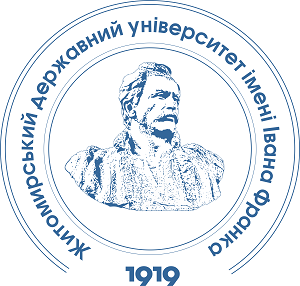FEATURES OF FUNCTIONAL STATE OF MONOCYTES IN CHRONIC HEART FAILURE
DOI:
https://doi.org/10.32782/naturaljournal.4.2023.3Keywords:
monocyte activity, NBT-test, chronic heart failure, coronary heart disease, hypertension.Abstract
Chronic heart failure pathogenesis is associated with various causes, and inflammation is one of the most important factors promoting the condition. In addition, monocytes, a group of cells present in the blood and infiltrating tissues, are known to participate in both pro- and anti-inflammatory processes and thus affect myocardial remodeling over time. The purpose of the study was to study the functional state of monocytes in chronic heart failure. The study included 149 patients with chronic heart failure, aged 18 to 75 years, who were undergoing inpatient treatment in the Heart Failure Department of the National Scientific Center “Institute of Cardiology named after Academician M.D. Strazheska of the National Academy of Medical Sciences of Ukraine” during 2020-2022. Patients were divided into subgroups based on the presence of atrial fibrillation, stage of heart failure, functional class, left ventricular ejection fraction, duration of disease, and diagnosis. The intensity of the intracellular oxygendependent metabolism of monocytes was studied in the nitroblue tetrazolium reduction reaction (NBTtest) taking into account the activation coefficient, which corresponds to their reserve capabilities and is defined as the ratio between spontaneous and pyrogenal-induced (10 μg/ml) NBT-tests. In the general group of patients with chronic heart failure, there was an increase in the activity of monocytes (p<0,05) and a decrease in the activation coefficient (p<0,05). At the same time, the activity of monocytes increased with the age of the disease. The greatest increase in monocyte activity is observed in patients with coronary heart disease and hypertension, and the least in patients with coronary heart disease but without hypertension. In patients with chronic heart failure of all studied subgroups, the indicators of spontaneous and induced NBT-test were very close and did not differ significantly from each other, which may indicate a significant activation of monocytes in these patients and a decrease in their reserve capacity. These changes will contribute to the deepening of the inflammatory process and depletion of compensatory capabilities of the body in these patients, which will lead to the progression of the pathological process.
References
Інсулінорезистентність та імунне запалення у пацієнтів із хронічною серцевою недостатністю. Т. І. Гавриленко та ін. Український медичний часопис. 2008. № 4. C. 37–41.
Желіба М. Д., Богачук М. Г. Результати цитогістохімічного дослідження нейтрофільних гранулоцитів у хворих із гнійно-запальними захворюваннями м’яких тканин на тлі цукрового діабету ІІ типу. Вісник Вінницького національного медичного університету. 2018. Т. 22. № 3. С. 468–470.
Прояви аутоімунізації та її взаємозв’язок із функціональною здатністю мононуклеарних клітин у хворих із кардіомегалією різного генезу. В. М. Коваленко та ін. Український ревматологічний журнал. 2009. № 4. С. 48–56.
Ломаковський О. М., Гавриленко Т. І., Лутай М. І., Підгайна О. А. Зміни функціональної активності імунної системи та ліпідного обміну впродовж тривалого спостереження пацієнтів з ішемічною хворобою серця та стабільною стенокардією. Український ревматологічний журнал. 2013. № 4. С. 61–66.
Dutka M., Bobinski R., Ulman-Wlodarz I., Hajduga M., Pajak C., Cwiertnia M. Various aspects in inflammation in heart failure. Heart Failure Reviews. 2020. 25. P. 537–548.
Grushko O. G., Cho S., Tate A. M. Glycocalyx Disruption Triggers Human Monocyte Activation in Acute Heart Failure Syndromes. Cardiovasc Drugs Ther. 2022. Р. 195.
Halade G. V., Lee D. H. Inflammation and resolution signaling in cardiac repair and heart failure. EBioMedicine. 2022. № 79. P. 103992.
Lu Y., Xia N., Cheng X. Regulatory T Cells in Chronic Heart Failure. Front Immunol. 2021. № 12. P. 732794.
Mesquita T., Lin Y.-N., Ibrahim A. Chronic low-grade inflammation in heart failure with preserved ejection fraction. Aging Cell. 2021. № 20. P. e13453.
Mongirdienė A., Liobikas J. Phenotypic and Functional Heterogeneity of Monocyte Subsets in Chronic Heart Failure Patients. Biology (Basel). 2022. № 11(2). P. 195.
Park B. H., Fikrig S. M., Smithwick E. M. Infection and nitroblue-tetrazolium reduction by neutrophils. A diagnostic acid. Lancet. 1968. № 2(7567). P. 532–534.
Paulus W. J., Zile M. R. From systemic inflammation to myocardial fibrosis: the HFPEF paradigm revisited. Circ. Res. 2021. № 128(10). P. 1451–1467.
Schiattarella G. G., Rodolico D., Hill J. A. Metabolic inflammation in heart failure with preserved ejection fraction. Cardiovascular Research. 2021. № 117. P. 423–434.
Shymanskyy I. O., Lisakovska O. O., Mazanova A. O., Riasniy V. M., Veliky M. M. Effects of vitamin D3 and vitamin E on prednisolone-induced alterations of phagocyte function. Eur Rev Med Pharmacol Sci. 2016. № 20(7). P. 1379–1383.
Zhang Y., Bauersachs J., Langer H. F. Immune mechanisms in heart failure. European Journal of Heart Failure. 2017. № 19. P. 1379–1389.





